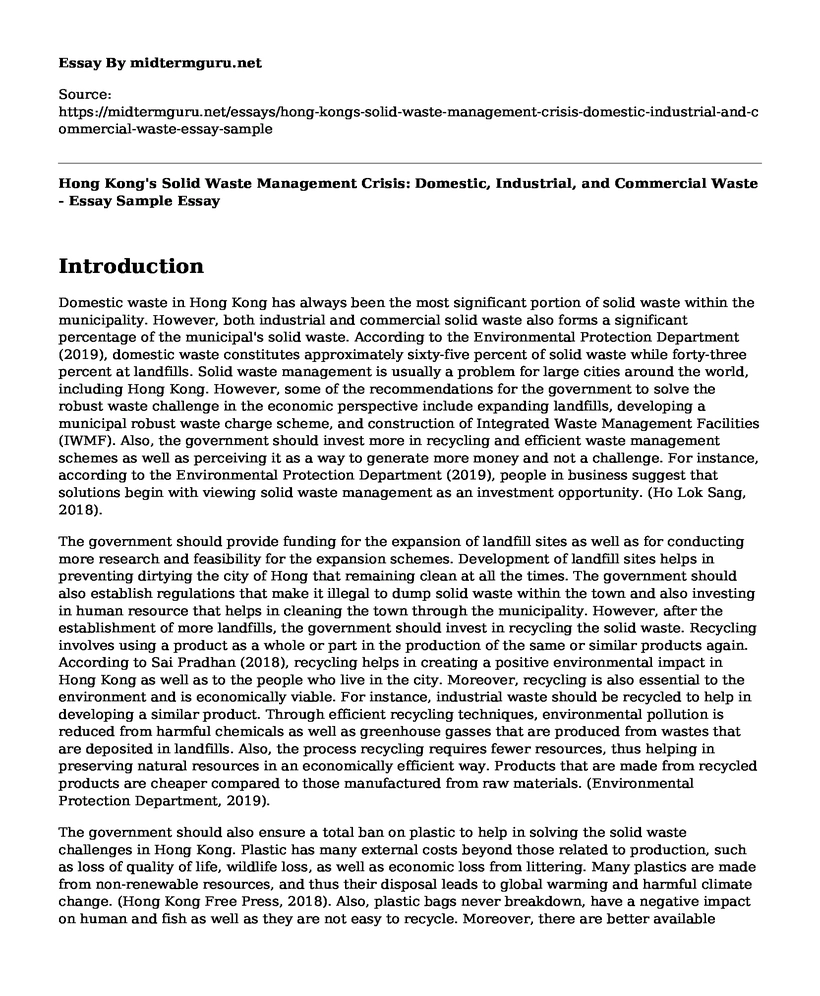Introduction
Domestic waste in Hong Kong has always been the most significant portion of solid waste within the municipality. However, both industrial and commercial solid waste also forms a significant percentage of the municipal's solid waste. According to the Environmental Protection Department (2019), domestic waste constitutes approximately sixty-five percent of solid waste while forty-three percent at landfills. Solid waste management is usually a problem for large cities around the world, including Hong Kong. However, some of the recommendations for the government to solve the robust waste challenge in the economic perspective include expanding landfills, developing a municipal robust waste charge scheme, and construction of Integrated Waste Management Facilities (IWMF). Also, the government should invest more in recycling and efficient waste management schemes as well as perceiving it as a way to generate more money and not a challenge. For instance, according to the Environmental Protection Department (2019), people in business suggest that solutions begin with viewing solid waste management as an investment opportunity. (Ho Lok Sang, 2018).
The government should provide funding for the expansion of landfill sites as well as for conducting more research and feasibility for the expansion schemes. Development of landfill sites helps in preventing dirtying the city of Hong that remaining clean at all the times. The government should also establish regulations that make it illegal to dump solid waste within the town and also investing in human resource that helps in cleaning the town through the municipality. However, after the establishment of more landfills, the government should invest in recycling the solid waste. Recycling involves using a product as a whole or part in the production of the same or similar products again. According to Sai Pradhan (2018), recycling helps in creating a positive environmental impact in Hong Kong as well as to the people who live in the city. Moreover, recycling is also essential to the environment and is economically viable. For instance, industrial waste should be recycled to help in developing a similar product. Through efficient recycling techniques, environmental pollution is reduced from harmful chemicals as well as greenhouse gasses that are produced from wastes that are deposited in landfills. Also, the process recycling requires fewer resources, thus helping in preserving natural resources in an economically efficient way. Products that are made from recycled products are cheaper compared to those manufactured from raw materials. (Environmental Protection Department, 2019).
The government should also ensure a total ban on plastic to help in solving the solid waste challenges in Hong Kong. Plastic has many external costs beyond those related to production, such as loss of quality of life, wildlife loss, as well as economic loss from littering. Many plastics are made from non-renewable resources, and thus their disposal leads to global warming and harmful climate change. (Hong Kong Free Press, 2018). Also, plastic bags never breakdown, have a negative impact on human and fish as well as they are not easy to recycle. Moreover, there are better available options to plastic bags, and therefore, the government should ensure a total ban on the plastics. Also, the government should initiate a plastic tax where customers and retailers pay more for each plastic used. Through, such initiative, the government will be in a position to control the use of plastics and thus an innovative way to solve the solid waste challenge in the economic perspective.
The government should invest in the establishment and expansion of incinerators. Incineration is a solid waste management technique which involves the burning of organic materials that are contained in waste materials. Therefore, the government should invest in combustion within the city of Hong Kong to help in solving the problem of waste management in the city in the economic perspective (Greentumble, 2018). The government should invest in incineration since it helps in reducing the total mass of waste by eighty-five percent as well as shrinking it by more than ninety percent. The government should take on the mandatory incineration of a certain type of waste such as hazardous and clinical waste where high temperatures destroy toxins and pathogens. Also, incineration is recommended to clinical and dangerous waste since such products cannot be recycled.
The construction of Integrated Waste Management Facilities (IWMF) would be a recommendation to help in solving the solid waste challenge in Hong Kong in the economic perspective (Greentumble, 2018). For instance, the IWMF can be used in recovering energy from the waste and converting the energy into electricity and thus supplying it to the many households within the city of Hong Kong. Moreover, implementing a municipal solid waste charge where the public is required to purchase certain designated garbage bags. Also, through the charging system, recyclables are separated from non-renewable products and thus help in minimizing the load that is put into garbage bags as an initiative to encourage recycling.
References
Environmental Protection Department. (2019). Strategic Landfills Retrieved from Environmental Protection Department Web Site: https://www.epd.gov.hk/epd/english/environmentinhk/waste/prob_solutions/msw_strategic.html
Greentumble. (2018). Waste Incineration: Advantages and Disadvantages Retrieved from Greentumble Web site: https://greentumble.com/waste-incineration-advantages-and-disadvantages/
Ho Lok Sang. (2018). Hong Kong is losing ground on solid waste management Retrieved from CHINADAILY Web site: http://www.chinadaily.com.cn/hkedition/2018-09/18/content_36932242.htm
Hong Kong Free Press. (2018). Amount of waste produced in Hong Kong at 20 year high as gov't misses target Retrieved from Hong Kong Free Press Web site:https://www.hongkongfp.com/2018/12/28/amount-waste-produced-hong-kong-20-year-high-govt-misses-target/
Cite this page
Hong Kong's Solid Waste Management Crisis: Domestic, Industrial, and Commercial Waste - Essay Sample. (2023, Jan 27). Retrieved from https://midtermguru.com/essays/hong-kongs-solid-waste-management-crisis-domestic-industrial-and-commercial-waste-essay-sample
If you are the original author of this essay and no longer wish to have it published on the midtermguru.com website, please click below to request its removal:
- The Forces That Are Reshaping the Management and Organizational Culture
- Supply and Demand in Tourism According to Goeldner and Ritchie
- The Importance of Turkey in Energy Hubs and Renewable Energy
- Essay on Predicting Hospital Readmission Risk
- Essay on International Law and Business: Dodd-Frank Act
- Fossil Fuels: Driving Engines & Environmental Pollution - Research Paper
- Innocence Project by Barry Scheck and Peter Neufeld - Essay Sample







